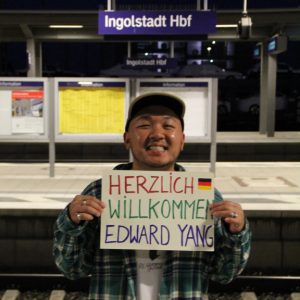A former Fulbright scholar, Eddie Yang is a doctoral student in English and comparative literature. Drawing from British literature of the 18th and 19th centuries, he hopes to produce a project that examines how authors and readers have historically interacted – and experimented with – genre traditions. “I have no doubt that literature has the power to create meaningful impact in the world,” he says, “and I want to help others experience its potential.” He also is a teaching fellow and graduate assistant for the McNair Scholars Program.

What made you choose UNC-Chapel Hill when deciding on a program/place to study?
Coming into doctoral study, I knew that my research interests – and the methodologies I want to use to pursue these interests – are often considered to be unorthodox and untraditional. I wasn’t quite sure how I would intellectually fit into my discipline at large and was worried about how much I might have to compromise my interests to further advance in the field. When I came to visit UNC, I was genuinely surprised by how much encouragement and support I received from my mentors. I felt that they were truly willing to help me pursue my interests in the ways I want to pursue them. However, I was also assured that I would receive the training necessary to become a professional in my field.
After having these conversations with my mentors, I felt that UNC would be the best fit for me intellectually. But on a more personal note, I wanted to branch out from what I had gotten so used to. I was born and raised in the Los Angeles area. Other than a semester spent studying abroad, I had spent my entire life in this one area. Before getting any older, I wanted to take on the challenge of moving into a completely new setting: one in which I knew absolutely no one.
Tell us about your research.
As a child of immigrants, and as someone who learned English as a second language, I’ve always been fascinated by the transmission of language, of expression. I’ve often wondered about the limits, and creative possibilities, of language and expression. This led me to my early interest in literature. Some of the questions I’ve been asking are: How have authors historically tried to express themselves? How have they experimented with different literary modes? And how have readers responded to these different forms of expression?
These questions have translated into my work, and now serve as the key questions I reflect on each day. I draw from British literature of the 18th and 19th centuries, to study the history of experimentation with literary form and genre. Ranging anywhere from the Gothic to the Bildungsroman, I engage with fiction that is seen as being representative of a particular genre. For my dissertation, I’d like to explore whether existing genre conventions stilt creativity – and experimentation with form – or if these conventions provide a new lexicon for writers to further experiment with.
How have you built community as a graduate student at Carolina?
Honestly, it took me quite a bit of time to settle into Carolina. For the first year and a half or so, most of my energy was spent trying to figure out my schedule, priorities and overall place here on campus. Everything felt so rushed, and I never felt that I had the time to really soak things in and think about where I am. This general sense of feeling unsettled, paired with my introverted tendencies, initially made building community quite difficult.
While experiencing these challenges with getting settled in, I would consistently receive invitations to attend different events from IME [Initiative for Minority Excellence], BOS [Brotherhood of Success], Grad Student F1RSTS and so many other entities on campus. I truly appreciated the fact that these groups were continuing to host, and invite me to, these events despite the fact that I wasn’t able to attend everything. I have come to the realization that I can’t commit to everything, and I can’t attend everything. However, I now know that there are a lot of people who understand the idiosyncrasies of graduate schedules and are happy to come together when possible. I would say that I’m definitely still adjusting to Carolina, but it’s nice knowing that I can adjust at my pace.
What are you hoping to accomplish with your Carolina degree?
When thinking about a specific career path, I would ultimately like to remain in academia as both a full-time professor and scholar. However, I would like to try to find a position that emphasizes the importance of teaching. As much as I enjoy engaging with my own research, I first entered this field wanting to teach: this remains my greatest passion. One of the aspects I’ve come to appreciate the most about my time at UNC has been the teaching opportunities. I hope to one day build on these experiences, and one day design––and teach––even more courses of my own.
In regards to a larger goal, I’d like to work against the notion that studying English––studying literature––doesn’t create real world impact. During my time studying literature thus far, I’ve gotten comments ranging anywhere from “It’s a discipline people settle on because it’s easy,” to “studying literature doesn’t actually accomplish anything.” I decided to study literature professionally because I wouldn’t be who I am today without it. My daily interactions, my thoughts and my life have all been shaped by the literature I’ve engaged with. I have no doubt that literature has the power to create meaningful impact in the world, and I want to help others experience its potential.
